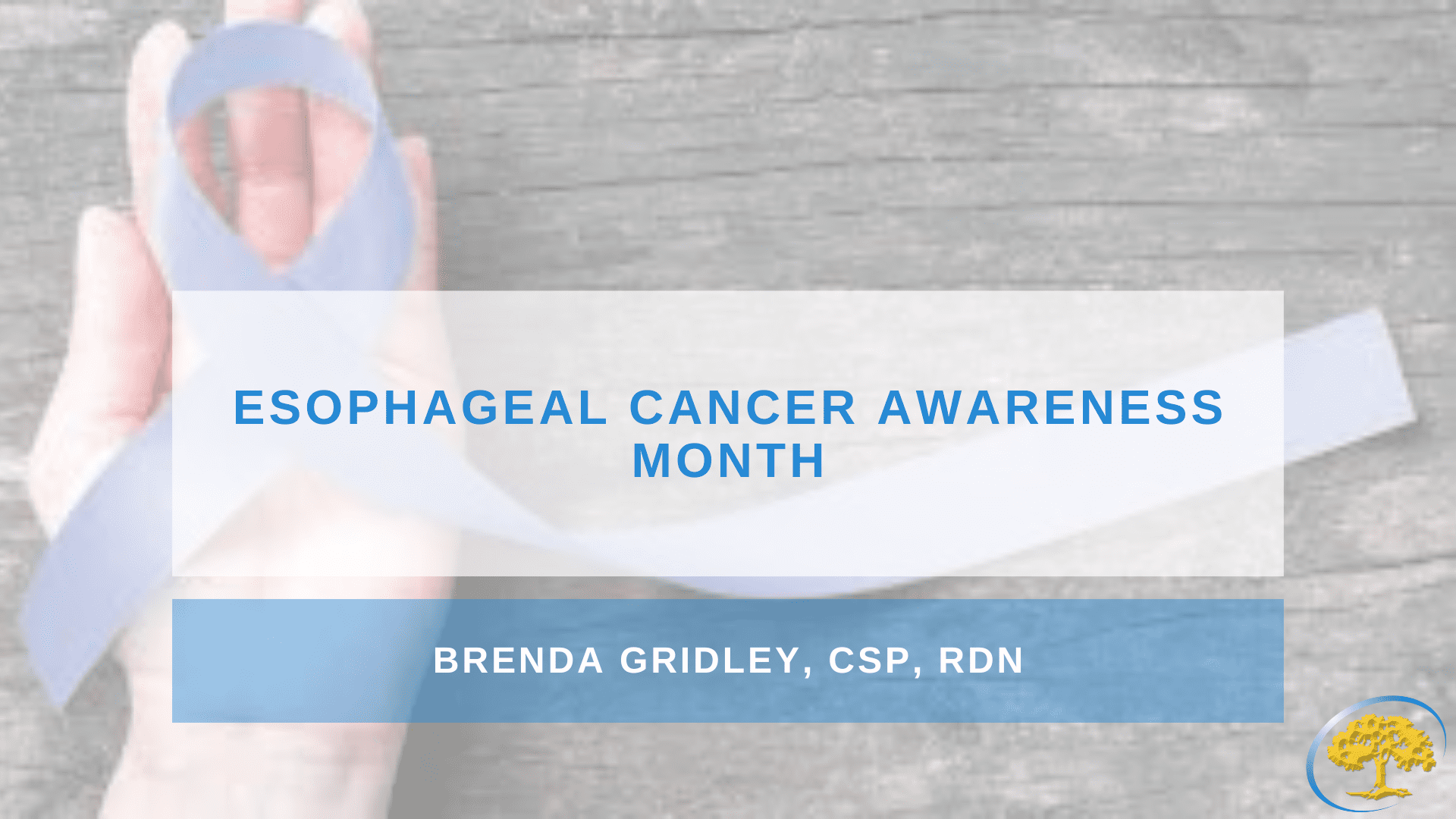
Posted 1 month ago
Esophageal Cancer Awareness Month
Esophageal cancer is a growth of cells that starts in the esophagus. The esophagus is a long, hollow tube that runs from the throat to the stomach, and it helps move swallowed food from the back of the throat to the stomach to be digested. Esophageal cancer usually begins in the cells that line the inside of the esophagus and can happen anywhere along the esophagus.
It is an aggressive cancer often diagnosed at advanced stages due to its asymptomatic early progression. Esophageal cancer treatment often involves surgery to remove the cancer. Other treatments may include chemotherapy, radiation or a combination of the two. Targeted therapy and immunotherapy also may be used.
Types of Esophageal Cancer
- Squamous Cell Carcinoma (SCC)
-Arises from the squamous epithelial cells lining the esophagus.
-More common in the upper and middle esophagus.
-Strongly associated with tobacco use and alcohol consumption.
- Adenocarcinoma
-Originates from glandular cells, typically in the lower esophagus near the gastroesophageal junction.
-Associated with gastroesophageal reflux disease (GERD), Barrett’s esophagus, and obesity.
-More prevalent in Western countries; diet related.
Risk Factors
Lifestyle & Environmental:
-Smoking and heavy alcohol use (especially for SCC).
-Obesity (linked to GERD and adenocarcinoma).
-Consumption of extremely hot beverages or foods.
Medical Conditions:
-Barrett’s esophagus (precancerous condition due to chronic GERD).
-Achalasia (a motility disorder increasing risk for SCC).
-Plummer-Vinson syndrome (iron deficiency anemia with esophageal webbing, linked to SCC).
Genetic & Other Factors:
-Alcohol and tobacco use.
-Family history of esophageal cancer.
-Exposure to nitrosamines (found in preserved meats, some pickled foods).
-Prior history of head, neck, or upper digestive tract cancers.
Symptoms (Usually appear in advanced stages)
-Progressive dysphagia (difficulty swallowing)—first to solids, then to liquids.
-Unintentional weight loss.
-Odynophagia (painful swallowing).
-Hoarseness, chronic cough, or hiccups (due to tumor involvement of adjacent structures).
-Regurgitation or vomiting (often with blood in later stages).
-Chest pain or retrosternal discomfort.
Prevention Strategies
-Tobacco and alcohol cessation.
-Weight management and GERD control to prevent Barrett’s esophagus.
-Avoidance of processed and red meat.
-Increased consumption of fruits and vegetables
-Surveillance endoscopy for high-risk individuals (e.g., Barrett’s esophagus with dysplasia).
Nutrition plays a crucial role in supporting patients with esophageal cancer, both during and after treatment. Since swallowing difficulties (dysphagia), weight loss, and malnutrition are common, dietary adjustments can help maintain strength and improve quality of life.
Nutritional Challenges in Esophageal Cancer
-Swallowing difficulties: Tumor obstruction or post-surgical changes can make it hard to eat solid foods.
-Weight loss: Due to reduced food intake and high metabolic demands.
-Gastroesophageal reflux: Acid reflux can worsen symptoms.
-Treatment side effects: Chemotherapy and radiation may cause nausea, loss of appetite, and difficulty swallowing.
Recommended Dietary Strategies
Soft and Easy-to-Swallow Foods
-Blended soups and smoothies
-Mashed potatoes, avocados, and bananas
-Oatmeal, yogurt, and pudding
-Scrambled eggs or soft-cooked vegetables
-Well-cooked pasta or rice with sauce
High-Calorie, High-Protein Diet
To prevent weight loss and muscle wasting:
-Protein sources: Eggs, Greek yogurt, soft cheeses, nut butters, and protein shakes
-Healthy fats: Olive oil, avocado, and soft nut butters
-Nutrient-dense liquids: Smoothies with protein powder, whole milk, or fortified plant-based milks
Small, Frequent Meals
-Eating 5-6 small meals per day can help prevent bloating and discomfort.
Managing Acid Reflux
-Avoid acidic, spicy, or greasy foods.
-Eat upright and remain sitting for at least 30-60 minutes after meals.
-Limit caffeine, alcohol, and carbonated beverages.
Hydration
-Sip fluids throughout the day, especially if eating less.
-Opt for calorie-rich drinks (e.g., meal replacement shakes) to maintain energy.
Special Considerations
-Tube Feeding (if needed): In advanced cases or post-surgery, a feeding tube may be required for proper nutrition.
-Nutritional Supplements: Consider high-calorie and high-protein shakes like Ensure, Boost, Weight Gainer powders or homemade alternatives.
Brenda Gridley, CSP, RDN
Brenda is originally from Los Angeles, CA where she attended California State University of Los Angeles for her under graduate degree in Nutritional Science. She began her career with Kaiser Permanente in 2004. Throughout her professional development, she has worked in Cardiology and open heart surgery, Renal/Dialysis, organ transplants and Oncology, including chemotherapy, radiation and head and neck. Brenda has extensive experience with weight management programs, including Bariatric and finally Eating disorders and mindful eating. She went on to specialize in the Pediatric population and has maintained her Certification in Pediatric Nutrition since 2011. Areas she has managed include pediatric and neonatal intensive care units where she was responsible for individualizing therapeutic diets and alternate nutrition support based on specific metabolic needs, medical conditions, and cultural preferences.
Her passion for nutrition was developed at a young age and reared by her grandmother who always instilled the importance of a healthy diet and active lifestyle. When her grandmother became ill, Brenda became aware of the impact nutrition plays in disease prevention and maintaining overall mind and body health. She cared for grandmother until she passed and has made it her goal to help others achieve their full “nutrition potential” with using a culturally sensitive holistic approach.
She is married with two beautiful daughters and in her spare time she enjoys watching movies with her children, experimenting with new recipes, reading mystery novels, running and Yoga.
Please ask your Ironwood Cancer & Research Centers provider for a referral to see our dietary counselors.

